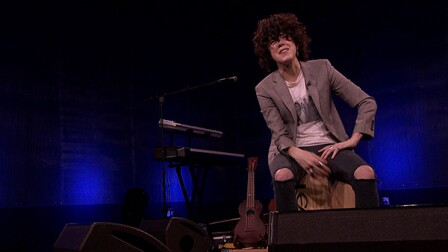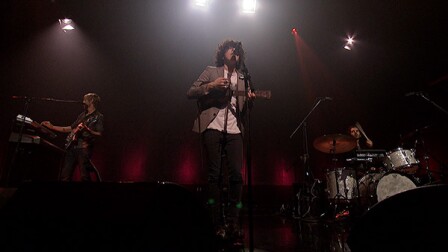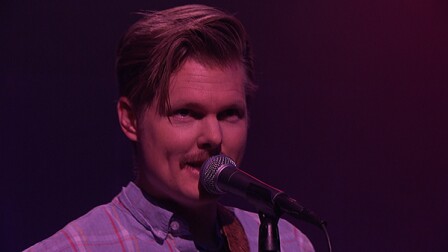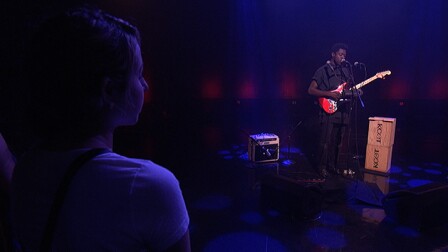
First Person: Maya Jupiter
Inspired by son jarocho, soul, dancehall, and hip hop, Maya Jupiter brings her lively stage performance to KCET's "Studio A." Her music fuses traditional Mexican folk and urban contemporary hip hop with socially conscious lyrics.
Discover more about Maya Jupiter in their own words.
On Her Heritage:
Maya Jupiter: I was born in Mexico. My father is Mexican, my mother is Turkish. We moved to Australia when I was one. I always joke that we went the wrong direction. We were the first of our family to migrate to Australia. It was difficult growing up without family around and especially not knowing other Mexicanos, for me. There was a large Turkish population. Sydney is very diverse. It was hard not to know who I was as a Mexicana, as a Mexican woman. So I identified with hip-hop. Hip hop became my culture because people from anywhere could be hip hop and I really related to it for some reason.
On Learning the Hip Hop Craft
MJ: I started rhyming when I was in high school, it was just a way to get my emotions and my feelings out on to paper and sort of release them. It was sort of my therapy I guess. But I started taking it seriously when I left high school and discovered the hip hop community in Sydney, which was made up of people of all disciplines: MCing, breaking, graffiti, turntablism... I just immersed my self in that culture and fell in love and wanted to participate in any way I could. In addition to making music, I also became a radio and television host because I really believed in putting the Australian voice on the map. I didn't grow up seeing women like me on television, so I liked the idea of changing the face of what it really means to be Australian.
MJ: It all started when I was about 15 or 16 years old. The first rap that I wrote was for a festival at my school called multicultural day. I did a whole verse about being multicultural and it was the story of migration. I didn't know what I was doing at the time, but when I you're older you look back and dissect it. I was telling our story, I was saying that we are coming from many lands, with families or alone. We come with one bag, and I just told the story of my family. And I as I started to search for my identity, what I discovered I would put into music. My hip hop was never straight beats and rhymes, it was always sampling latino music. I had salsa in one of the first songs I ever did, I had Spanish in my choruses, and sometimes I would get some flack for that. But I couldn't help that, once the hip hop came through me, that's how it came out. And as I got older, I used to appreciate that.
On Moving to Los Angeles
MJ: I fell in love with Aloe. I was ready to leave Sydney and have an adventure. I wanted to spend time living somewhere else and learning something new. I always felt like the album I wanted to make couldn't be made in Sydney. The kind of sound I wanted to go for, which was not sampling beats anymore. I wanted to step away from sampling and writing a rhyme. When I met Aloe, I felt in my heart that I wanted to see where our relationship would go and also to further my musical ambition.
MJ: I truly made the album that I always wanted to make. When I landed here, I had a friend introduced me to Quetzal Flores and Martha Gonzalez of the Chicano rock band Quetzal. It was just the right moment. They had just come back from Mexico. We had about six jam sessions, and from that came this music.

On What Quetzal Added to her Process:
MJ: For one, they brought community, introducing me to the Chicano/Chicano community here in East L.A. I've been adopted, they call me the Chicana from Down Under. I feel like I got family, I got friends, and I have a sense of belonging. It's a little strange, I also feel very Australian, and being in America, I realize how Australian I am. I also never experienced a sense of community in this way, to be around Chicano/Chicanas. I think Quetzal and Martha brought that to the music, also just introducing son jarocho. I had been introduced to the son jarocho tradition, but I had never participated in it. With Quetzal and Martha, I became a participant. A lot of the instruments on the album are part on the son jarocho genre, but it's a mix because of who I am and what everybody brings.
On the Song "I Am"
MJ: "I Am" is a song that I don't even remember writing. The message just came out through me. Aloe told me to pick one idea and go for it. So I picked truth, the truth about life and the world. And it came out that way. I think the truth is what it is. Everything is so, and everything else is our interpretation. When people try to cover up history, it doesn't mean that those instances didn't happen. As time goes on, the more I listen to it, the more I get new things myself out of it. Having a daughter has made me very aware of being present. I feel that in "I am" it means being in the present. It's just about being in the moment.
On the Song "Inshallah"
MJ: "Inshallah" is brand new. I wanted to share it because it's where I am at right now. As I write, all I can write about is my experiences as a new mother. "Insh'allah" means god willing. This is something universal. For me at the time, it was about this life coming to earth and the prayer that we have that this baby is safe and everything turns out okay. That's what the song is about.

On Working with Aloe
MJ: I interviewed Aloe for a music show in Australia. So I heard his first independent album. As I was listening to his music, I had this moment when I thought, 'If I lived in L.A. we would totally be friends. One day I would collaborate with him.' I just totally connected with all his musical inspirations. That's the part of the reason why we clicked. When we started dating, I told him you never have to sing with me, only if you want to as an artist. But it's been really awesome, he's one of the producers on the album, and having his experience and his input and his musical influence on the record is really balancing because there is this new kind of son jarocho, hip hop, rock, and... I am hip hop, here comes Aloe with the soul, and it all comes together.
On the song "El Secreto"
MJ: "El Secreto" features my grandfather. He is 94 years old right now. He was married to my grandma for sixty something years. We went to Mexico before we got married. Aloe met my family and I asked my grandpa what is the secret in a long marriage. They still had all this love and admiration. So Aloe recorded it, we took it home, and I said this is the song. We created a song about this recording, and it really is the hardest song for me to sing because I want to cry everytime I sing it because I think of my grandparents. And I miss my grandmother, and just everything associated with that. I just get overcome with emotion because I aspire to become like them in my life.
On Working With a Spouse
MJ: I think the essence of it is communication. It's about being honest with one another. That's all it is and it's about believing, not giving up, and making it work. I think fundamentally, Aloe and I want the same thing in this world: we want to make a difference through our art. And everything else doesn't matter, we know that everything else we can work out because that's our goal. As individuals, we come together and we want to raise children together that are happy, healthy, strong, independent -- and as I say in "Inshallah" -- who are fighting for voices unheard. We want to raise kids who contribute and who give back and are mindful of being balanced in this world right now.

On Working with Youth
MJ: I've always just engaged with youth because I have to. It's about them, it's about community. And I enjoy facilitating song writing workshops here in L.A. with Radio Sombra. I've facilitated radio workshops with youth from Roosevelt High School because it's something I know how to do, so I pass it on. I think it's really important to be able to express yourself. it got me through the divorce of my parents, it got me through bullying in high school -- those times when you think the world's going to end because you're a teenager and the world's going to end. Expressing yourself is fundamentally important to every human being. Everyone has the right to have their voice heard. Whatever I've got, I pass it on. It's not about the fame or the fortune, it's about sharing and building up.
On the Song "Rico"
MJ: So "Rico" is a really cool song with Aloe and I love performing this one. The song has a little steel pan in it, so it has a real island flavor to it musically. And it talks about the little that I have, and I actually collaborated with Martha for the Spanish on the album, she helped me write it and shes a brilliant writer. So the idea is, what little I have, I give to you. It's really about if there is one person struggling, then we are all struggling. At the end of the day, no matter what troubles we have, there is always hope and there is always joy. And that's something I learned from my family in Mexico who are very poor, but happy. They've really taught me this joy. My mom also said, "Don't write so many songs that are depressing!" because I write songs that are really political sometimes. She's like, "Life's about fun too." You have to appreciate what you have, and you have to celebrate that too. So that's my attempt to say "Okay, sometimes things are hard, but you always have hope and things are going to get better." Let's have fun with our friends and family, that's all that really matters.











